Paisley: Why there’s far more to this Scottish town than Paolo Nutini and patterns
“Straighten your fingers, that’s right. Now blow.”
“Fffppppppzzzzz…”
I sound like a drunk goose. This can’t be right.
“That’s right! Now lift that finger there.”
I blow again. I still sound like a drunk goose, only this time at a slightly higher pitch. A drunk goose who’s been kicked in the nuts, perhaps. The problem with trying to learning the bagpipes – well, the warm up to the bagpipes, something called a chanter that looks like a cross between a recorder and a tin whistle – is that I have no idea what it’s meant to sound like in the first place.
Love it or hate it, the Marmite of the instrument world is no mean feat to learn: my patient instructor tells me it usually takes kids anywhere from six months to two years of mastering the chanter before they’re allowed to pick up the real thing. I’ve had less than five minutes making a noise that’s closer to a dying animal than “music”, but still, I’m not going to leave the 2019 British Pipe Band Championships, held annually in the Scottish town of Paisley, without being able to say I gave it a proper bash.
I’m told to hold the bag like a baby (so, awkwardly then?) and blow into it with everything I’ve got. Just as I feel like I’m about to pass out, I make a noise akin to a wheezing badger – which is probably the best I could expect, all things considered. The expert then takes the helm, playing a traditional tune in which every note bleats out clear and true above the drone, attracting admiring glances from passers-by.
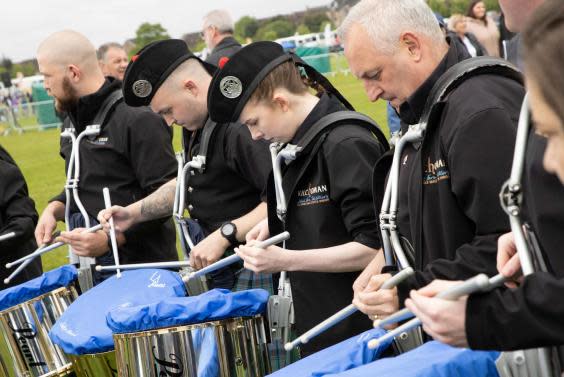
If you’ve ever thought the bagpipes were to music what Piers Morgan is to feminism – tenuously connected, but not in a good way – then perhaps a pipe band competition isn’t for you. Or perhaps it is: I was on the fence about the instrument until I spent the best part of a day watching the very best in Britain go head to head.
Forget the solitary piper: this is all about the ensemble effect. The pipes themselves are just one piece of a puzzle that encompasses base, snare and tenor drums, the last of which are played in between elaborate, performative swings of the sticks, known as flourishes. If the band is marching, the drum major is also in play, leading the rest of the team and wielding a “ceremonial mace”. It feels as much about the performance as it is about the precision of the sound, and it’s far more enjoyable to watch – and listen to – than you might expect.
“There’s something about the bagpipes if you’re a Scot,” Ewan MacDonald, whose father owns famed local kilt shop Houston, told me earlier in the day as we strolled around his tartan-festooned workroom. “They make you feel emotions you didn’t know you could feel.”
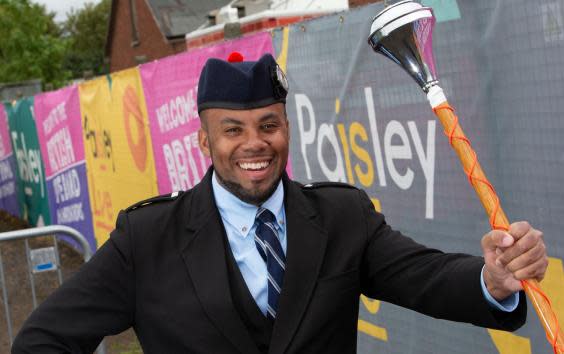
In a town that once grew prosperous off its thriving textile industry, Houston is the last true bastion keeping the fabric business alive in these parts. Pre-mechanisation, the town had both Clarks and Coats, a threadmaking and weaving business respectively, which joined forces in the 1890s to create a textile empire employing more than 6,000 people. Now, with most outfits outsourcing to China, it can be a struggle to keep a local enterprise going – except when it comes to kilts, it seems. Even on a drizzly Saturday there’s a steady flow of customers coming through the door, although the big business comes from overseas, according to Ewan.
“We do a lot of bespoke tartans these days,” he says. “We get to be creative, come up with ideas, make something new.” Lots of these orders flood in from the US and Canada; people with Scottish heritage are keen to connect with their roots.
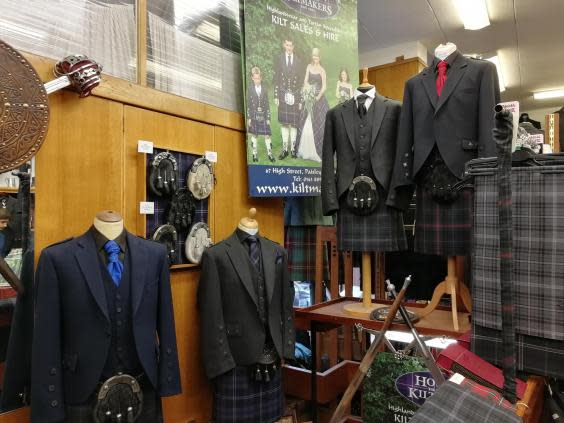
Paisley’s an intriguing place. For many, the name conjures up the spectre of musician Paolo Nutini (whose dad still owns a chippie on the high street) clad in the town’s namesake patterned material. They might know it’s close to Glasgow, or that other famous alumni include Gerard Butler and David Tennant. But there’s much more to it than that.
For one, it’s beautiful. A run of handsome Victorian and Georgian buildings seem to glow against the grey clouds. Many of these were built on textiles – the neo-gothic Thomas Coats Memorial Baptist Church and the Coats Observatory (Scotland’s oldest) were both left as legacies to the town. Then there’s the magnificent pillared town hall, and the neighbouring 12th century abbey, looming with awkward, oversized grace.
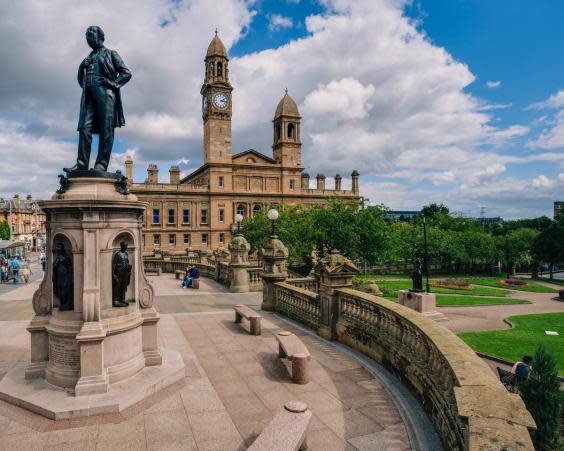
On top of that, it’s a town that punches well above its weight, an ambitious underdog determined to take its place at the table and unapologetically show off its best bits. The tourism website is design-y and fresh; there’s a packed schedule of events post-Pipe Band Championships, from Sma’ Shot Day (one of the oldest workers’ festivals in the world) to music and arts festival The Spree; and Paisley even launched a bid (and got pretty far) to be 2021 city of culture, despite not even being a city. It just missed out to Coventry, but no matter – this is a town that seems to live by the mantra “go big or go home”.
“We’re not trying to compete with Glasgow,” Graeme McLatchie, senior marketing executive for Renfrewshire Council, says. “But we’re showing that a visit to Paisley can absolutely complement a trip to the city.”
The next stage of this evolution into Kind of a Big Deal territory is a £100m investment in various infrastructure projects, including a £22m revamp of Paisley Town Hall and a huge £42m overhaul of Paisley Museum, which is closed until 2022 while it’s transformed into an “international-class destination” that can handle four times the current number of visitors.
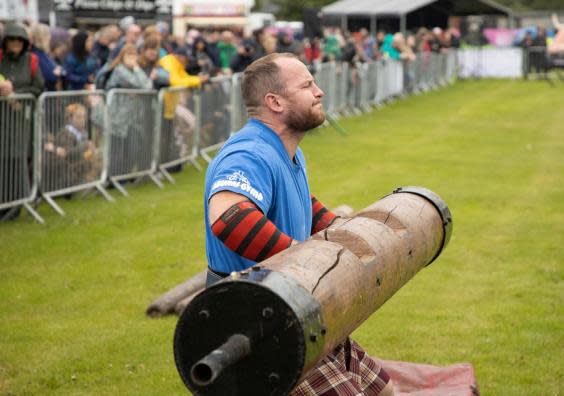
Back at the championships and there’s more to see than pipes – in a whirlwind of an afternoon, I manage to catch competitive Highland dancing, an edited-down Highland games that sees professional “strong men” hurl tree trunks across a field and, of course, more bands than you can shake a ceremonial mace at. I even meet Charlie Brown, a young man who’s travelled all the way from Brooklyn to compete in the drum major tournament (he obviously took no heed of the word “British” in front of “Pipe Band Championships”).
The main event is the March Past at the end of the day, a huge parade of all 120 bands across a damp field. There’s something eerily lovely about hearing the continuous sound of the drums and pipes as each of the bands appears through the gloom, stoic and sombre as they strut in time.

“You’ll hear pipes buzzing through your brain for the next 48 hours,” the event photographer warns me as we stand and stare. Later that night, indulging in a well-earned dinner of baked cheddar mushrooms and melt-in-the-mouth monkfish and king prawn curry at locals’ favourite the Pendulum Bar and Grill, I realise he was right. “Fffppppppzzzzz,” goes my muddled mind, over and over again.
They’re still there the next morning too, as I lie on a spa lounger overlooking the sublime River Clyde at Gleddoch Hotel, my well-positioned digs for the weekend.
The beat goes on; those damn pipes are still running through my head. But I kind of like it. They sound a lot better than a drunk goose, that’s for sure.
Travel essentials
Getting there
British Airways, easyJet and Loganair all fly direct from London to Glasgow. Paisley is a 10-minute drive from the airport.
Staying there
Gleddoch Hotel offers doubles from £99, room only.

 Yahoo News
Yahoo News 
